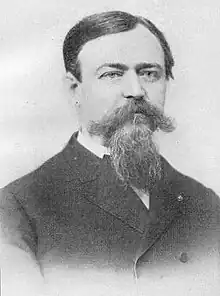James A. Sexton
James Andrew Sexton (January 5, 1844 – February 5, 1899) was an American soldier, businessman, and Republican politician from Chicago who served as Commander-in-Chief of the Grand Army of the Republic until his death.
James A. Sexton | |
|---|---|
 | |
| Commander-in-Chief of the Grand Army of the Republic | |
| In office 1898–1899 | |
| Preceded by | John P. S. Gobin |
| Succeeded by | William C. Johnson |
| Postmaster of Chicago | |
| In office 1889–1893 | |
| Appointed by | Benjamin Harrison |
| Preceded by | Walter C. Newberry |
| Succeeded by | Washington Hesing |
| Personal details | |
| Born | January 5, 1844 Chicago, Illinois |
| Died | February 5, 1899 (aged 55) Washington, D.C. |
| Nationality | American |
| Political party | Republican |
| Military service | |
| Allegiance | United States of America Union |
| Branch/service | United States Army Union Army |
| Years of service | 1861–1865 |
| Rank | |
| Battles/wars | American Civil War |
Biography
Sexton was born in Chicago in 1844 and enlisted in the Union Army at the outbreak of the American Civil War, rising to captain and serving on the general staff of General William S. Smith. He participated in the Battles of Columbia, Spring Hill, and Franklin. Following his service, Sexton returned to Chicago where he founded Cribbon, Sexton and Company, a stove manufacturing firm. Politically a Republican, Sexton served as an elector in the 1884 United States presidential election and was appointed postmaster of Chicago by newly elected President Benjamin Harrison in 1889, remaining in office until 1893. He was also Sexton was active in veteran's affairs and served as a colonel in the Illinois National Guard. He was chosen Commander-in-Chief of the Grand Army of the Republic in 1898, a position he filled until his death at the age of 55.[1][2]
References
- The International Year Book: A Compendium of the World's Progress During the Year 1899. Dodd, Mead & Co. 1900. p. 733.
- Republicans of Illinois: A Portrait and Chronological Record of Members of the Republican Party. The Lewis Publishing Company. 1905. p. 376.